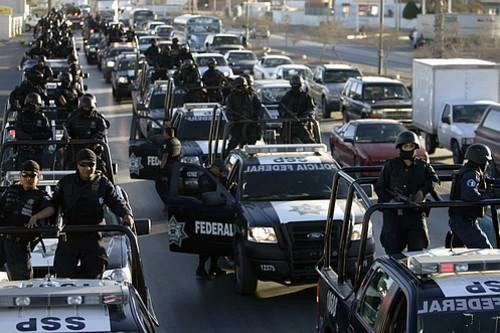Violence Costs Mexico 15% Of Its GDP In Health Care, Security Expenses And Material Losses

Violence in Mexico has reached alarming levels in the past few years, harming the country's image outside its borders. Within Mexico, crime claims not only its direct victims, but is also costing the country a significant chunk of its GDP.
Mercedes Juan López, head of the Health Department, said Thursday that violent crimes cost Mexico between 8 and 15 percent of economic output every year. The costs of material damage, insurance and medical care for victims as well as lost productivity account for the surprising figure, she said.
According to the World Health Organization, homicides went from being the tenth leading cause of death in Mexico to the sixth in 2012. Last year, 59,000 Mexicans met violent deaths, including assaults, domestic violence and suicide.
“This is the time to change this trend, to reverse the circle of violence,” said Juan López. “We do not want our children and youth to die in a street quarrel.”
“Insecurity is affecting foreign investment and tourism to the country, and it is increasing companies’ expenses since they have to pay for protection and safety,” she added, saying that insurance companies expend 12 billion pesos ($930 million) yearly in life insurance and protection.
The Instituto Nacional de Estadística y Geografía (National Statistics and Geography Institute, or INEGI) pointed out, however, that the direct cost of violence, in material losses, is of 215 billion pesos ($16.6 billion), which makes up 1.3 percent of the country’s GDP. The remainder is attributed to company expenses like security and health care.
Mexico has become one of the most dangerous countries in the world. In the Global Peace Index 2013, compiled by non-profit Vision of Humanity, it ranked at a grim 133 out of 162, second worst in Latin America after Colombia (147) and a far cry from Uruguay, which at 24 fared the best in the region.
When President Enrique Peña Nieto was campaigning prior to the elections in 2012, one of his promises was to reduce homicides, extortion cases and kidnapping. One year into the presidency, Peña Nieto’s administration claims that the homicide rate has dropped by 18 percent, but kidnappings have risen 35 percent, according to the Baker Institute.
At street level, numbers do not look any better: In a poll by national newspaper El Universal, half (49 percent) of Mexicans said drug violence is worse since Peña Nieto took office.
© Copyright IBTimes 2025. All rights reserved.



















